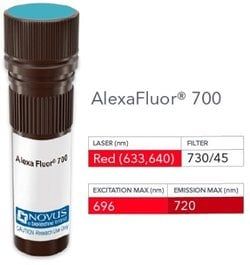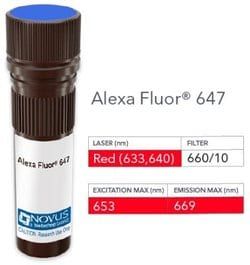Cytokeratin 8 Antibody (SPM538), Alexa Fluor™ 700, Novus Biologicals™
Manufacturer: Novus Biologicals
Select a Size
| Pack Size | SKU | Availability | Price |
|---|---|---|---|
| Each of 1 | NBP234417Z-Each-of-1 | In Stock | ₹ 57,494.00 |
NBP234417Z - Each of 1
In Stock
Quantity
1
Base Price: ₹ 57,494.00
GST (18%): ₹ 10,348.92
Total Price: ₹ 67,842.92
Antigen
Cytokeratin 8
Classification
Monoclonal
Conjugate
Alexa Fluor 700
Gene Alias
CARD2, CK8, CK-8, CYK8cytokeratin 8, Cytokeratin-8, K2C8, K8cytokeratin-8, keratin 8, keratin, type II cytoskeletal 8, keratin-8, KO, Type-II keratin Kb8
Host Species
Mouse
Molecular Weight of Antigen
52.5 kDa
Quantity
0.1 mL
Research Discipline
Cancer, Cytoskeleton Markers
Gene ID (Entrez)
3856
Target Species
Human, Rat, Zebrafish
Form
Purified
Applications
Western Blot, Flow Cytometry, ELISA, Immunocytochemistry, Immunofluorescence, Immunohistochemistry (Paraffin)
Clone
SPM538
Dilution
Western Blot, Flow Cytometry, ELISA, Immunocytochemistry/Immunofluorescence, Immunohistochemistry-Paraffin, Immunohistochemistry-Frozen
Gene Symbols
KRT8
Immunogen
Cytoskeleton preparation containing cytokeratin 8 (Uniprot: P05787)
Purification Method
Protein A or G purified
Regulatory Status
RUO
Primary or Secondary
Primary
Test Specificity
Cytokeratin 8 (CK8) belongs to the type II (or B or basic) subfamily of high molecular weight cytokeratins and exists in combination with cytokeratin 18 (CK18). CK8 is primarily found in the non-squamous epithelia and is present in majority of adenocarcinomas and ductal carcinomas. It is absent in squamous cell carcinomas. Hepatocellular carcinomas are defined by the use of antibodies that recognize only cytokeratin 8 and 18. CK8 exists on several types of normal and neoplastic epithelia, including many ductal and glandular epithelia such as colon, stomach, small intestine, trachea, and esophagus as well as in transitional epithelium. Anti-CK8 does not react with skeletal muscle or nerve cells. Epithelioid sarcoma, chordoma, and adamantinoma show strong positivity corresponding to that of simple epithelia (with antibodies against CK8, CK18 and CK19). Reportedly, anti-CK8 is useful for the differentiation of lobular ('ring-like, perinuclear') from ductal ('peripheral-predominant') carci
Content And Storage
Store at 4C in the dark.
Isotype
IgG1 κ
Description
- Cytokeratin 8 Monoclonal specifically detects Cytokeratin 8 in Human, Rat, Zebrafish samples
- It is validated for Flow Cytometry, Immunohistochemistry, Immunocytochemistry/Immunofluorescence, Immunohistochemistry-Paraffin.


